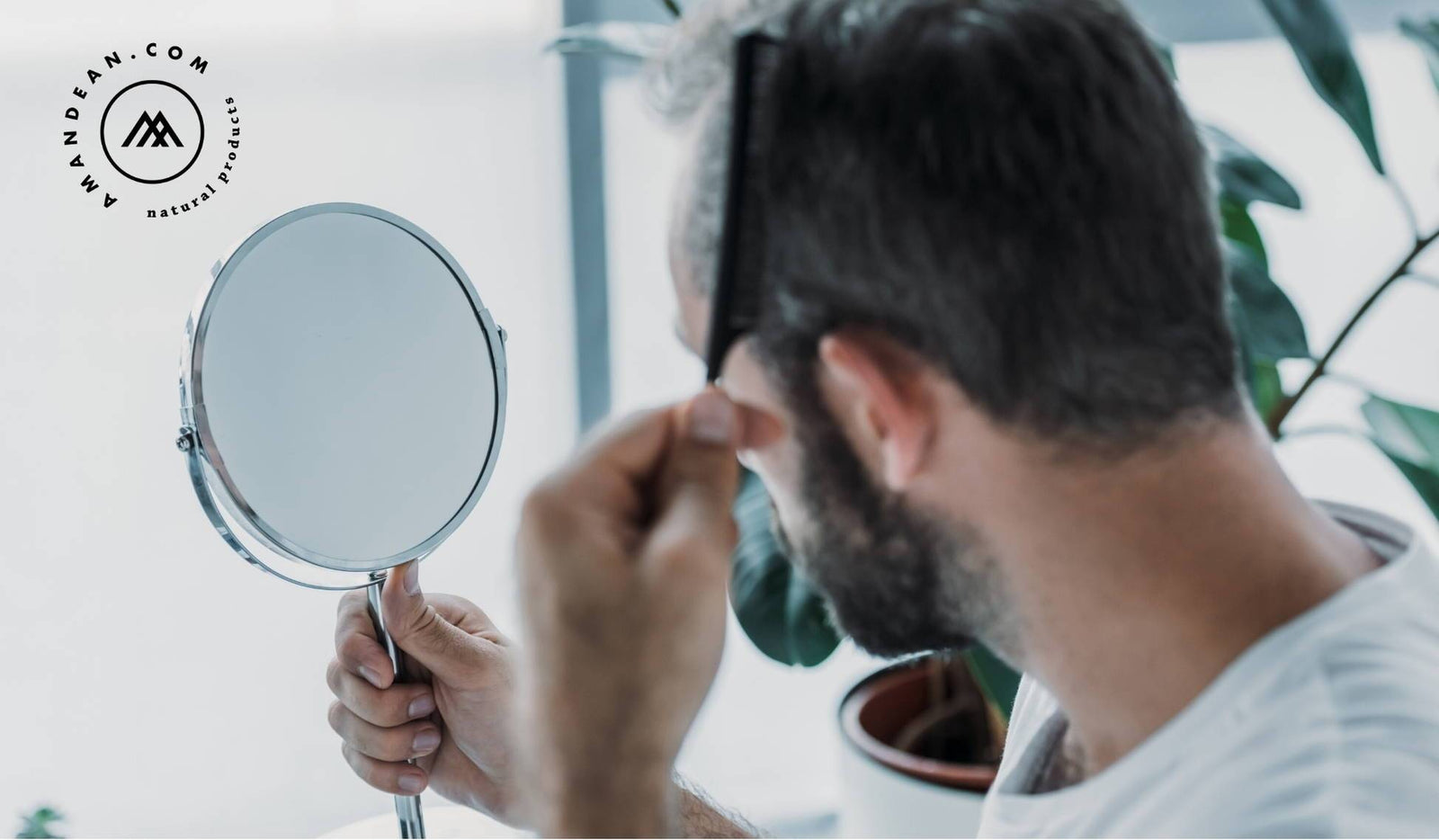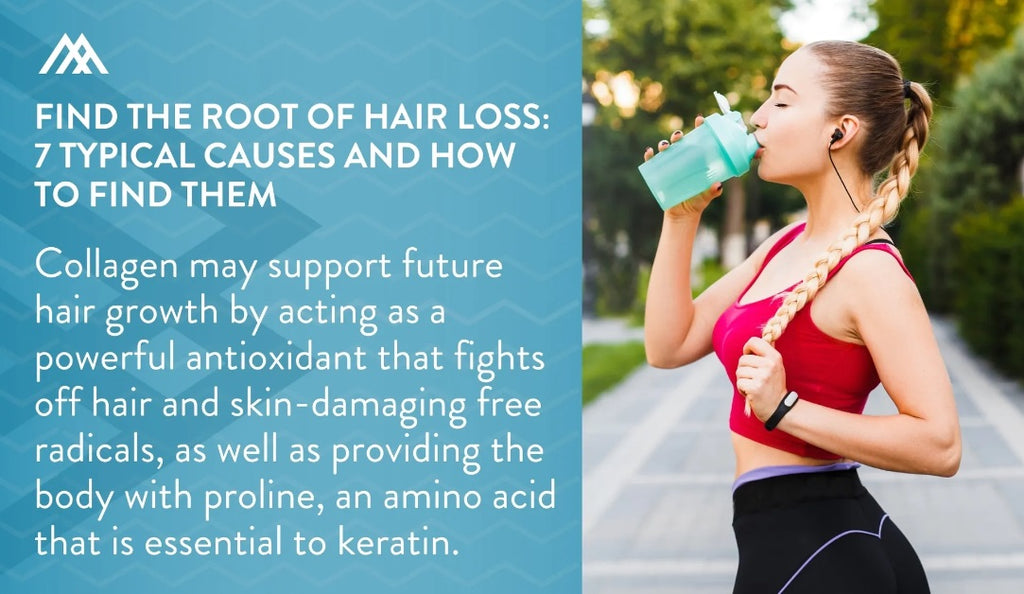Your Cart is Empty

December 08, 2020 7 min read
We can spend hours styling our hair, but we don't typically give our individual hair follicles much thought. What even is hair?!

Every hair follicle is made from a protein called keratin. Follicles are rooted in the dermis by the hair bulb where new cells "collect" and build upon each other to form the strand. Blood vessels and sebum work together to nourish the hair and keep it silky and strong as it grows. Hair growth comes in cycles and can vary depending on your health and age, but the average person's hair grows by about 1/2 inch per month. The growth cycle of an individual follicle is divided into three stages:
Hair shedding is a part of the normal hair life cycle. In fact, the American Academy of Dermatology (AAD) said "It’s normal to shed between 50 and 100 hairs every day." Out of the ~100,000 hairs on your scalp, losing just 50 doesn't seem like such a big deal! However, if you seem to be losing more or notice sparse patches beginning to form on your head, it might be time to raise an eyebrow.
Hair loss, hair shedding, and hair thinning are not the same things. Hair shedding refers to the natural fallout of old hairs replaced with new ones. Hair lossis when the hair falls out without having a "replacement" to come in after it. Just like hair shedding, hair loss is normal to an extent; it's estimated that about 35 million men and 21 million women in the U.S. have issues of hair thinning or hair loss at some point in their lives.
There are many different types of hair loss. Hair can fall out in patches or thin overall and can range in severity, even leading to baldness. Getting to the root cause of hair loss can be tricky, but more often than not, it can stem from one (or more) of the following causes:

Sometimes referred to as androgenic alopecia, male pattern baldness, or female pattern hair loss, this is by far the most common cause of hair loss for both men and women. This is a form of hereditary hair loss that is usually characterized by a receding hairline and thinning of hair and bald spots at the crown of the head. Hormones and family history both play into an individual's risk of this type of hair loss. For men, family history seems to be the biggest determinant whereas, in women, menopause (which alters hormone levels) is the guiltiest culprit of hair loss. This can eventually lead to female-pattern baldness.
This is hair loss that's brought about by stress. The tricky part in spotting it is recognizing that it usually occurs 2-3 months after a stressful event, such as a major illness, surgery, infection, major weight loss, or after childbirth. This is because it creates a large amount of the male hormone androgen.
This type of hair loss causes hair to fall out in patches and is due to a fungal infection of the scalp. This is common in children and causes the scalp to become dry, flaky, and scaly.
Alopecia areata is an autoimmune disease in which the immune system attacks the hair follicles and causes them to fall out and form bald patches. It can also affect other areas of the body and is commonly diagnosed along with other autoimmune conditions.
Hair loss is a surprisingly common side effect of a number of medications. Typically drugs that alter hormone levels have the greatest effects and can include beta-blockers, birth control pills, cancer treatment, hormone replacement therapy, steroids and acne medications.

Traction alopecia is caused by prolonged tugging on the hair follicles as a result of certain hairstyles. Tight braids, such as cornrows, can cause the hair to fall out at the root.
As we mentioned above, certain conditions such as autoimmune diseases can cause the hair to fall out. Trichotillomania is a mental condition in which individuals pull out their hair. Autoimmune diseases, syphilis, polycystic ovary disease, thyroid diseases (both hyper and hypothyroidism), sex-hormone imbalances, a protein deficiency, or an iron deficiency (anemia) can cause temporary or permanent hair loss. With any type of hair loss, it's best to consult a doctor or dermatologist so they can get a full view of your symptoms and identify any other illnesses.
Treating hair loss first starts with understanding the type of hair loss you're experiencing. If you're concerned about your hair growth or lack thereof, you can ask yourself these 4 questions to find the most likely cause.
If you're concerned about your hair loss at any rate or stage, you should contact your doctor or dermatologist to find what medical treatments are right for you.
Your doctor will be best able to diagnose your hair loss and recommend the most effective treatment options for you. Your doctor will likely perform a "pull test" in which they see how many strands of hair fall out from light tugging, but they can also run blood tests, thyroid tests, and hormone tests to verify what is causing the hair to fall out. From there, they may recommend using the popular hair-regrowth medications minoxidil (rogaine) or finasteride (propecia). Many people are also seeking out hair transplants to restore receded hairlines and regrow hair in bald spots, but if you aren't willing to take the leap or are looking for more affordable alternatives, you can try any of the following:

Hair loss is a bummer, but in many cases, it can be explained and reversed just by eating more diverse and wholesome meals and adding a supplement to your diet here and there. It never hurts to add some more leafy greens and whole grains to your diet, but if you're worried about your hair loss at any stage, contact your doctor to help get to the root of your hair loss and find ways to stop it in its tracks.
Hair growth occurs in cycles and can vary depending on your health and age. The average person's hair is approx. 1/2 inch per month.
Androgenic alopecia, male pattern baldness, or female pattern hair loss, is by far the most common cause of hair loss for both men and women.
Traction alopecia is caused by prolonged tugging on the hair follicles as a result of certain hairstyles.
Collagen may support future hair growth by acting as a powerful antioxidant that fights off hair and skin-damaging free radicals, as well as providing the body with proline, an amino acid that is essential to keratin.
Take our quiz and find which supplements your body is craving.
